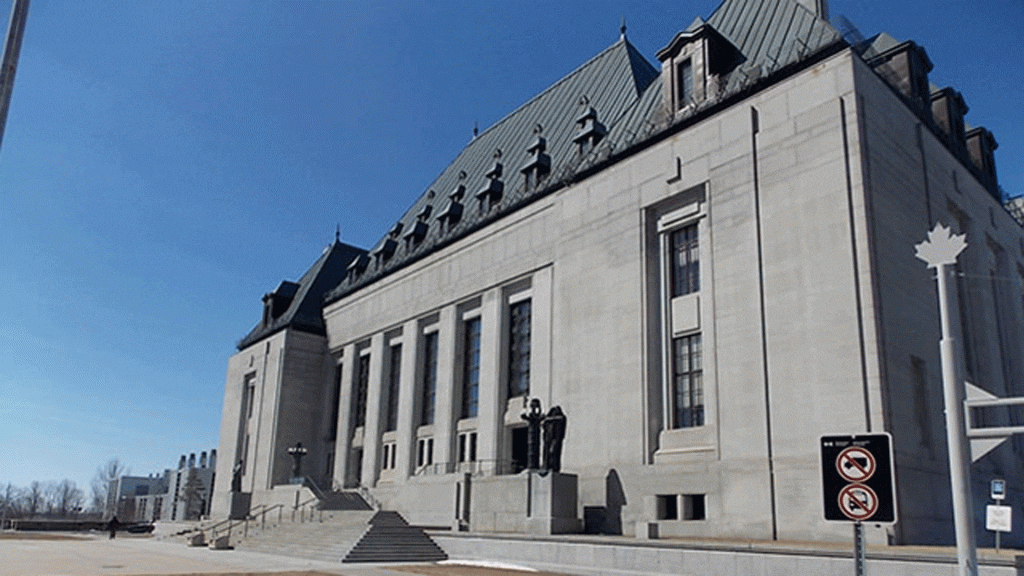
The Supreme Court of Canada is located in downtown Ottawa west of Parliament Hill. Photo: APTN file
The federal government is appealing to the Supreme Court of Canada after Quebec’s top court struck down key clauses in the Liberals’ Indigenous child welfare law.
Better known by its former bill name, C-92, the Act respecting First Nations, Inuit and Métis children, youth and families recognizes Indigenous communities’ inherent jurisdiction over their children.
Two of its clauses — sections 21 and 22(3) respectively — give Indigenous laws the force of federal law and empower them to override conflicting provincial statutes. On Feb. 10, the Quebec Court of Appeal ruled those sections are unconstitutional.
On Monday afternoon, three federal cabinet ministers announced they’d be heading to the country’s highest court to fight the annulment of those two sections.
“The Quebec Court of Appeal’s decision raises important questions regarding how communities can implement their jurisdiction over child and family services without being unduly impeded by provincial laws,” said ministers David Lametti, Marc Miller and Patty Hajdu in a joint statement.
“We look forward to the Supreme Court of Canada’s direction on the best approach to ensuring that Indigenous communities can effectively exercise their jurisdiction, unencumbered by conflicting laws.”
The ministers also said they welcome the bulk of the decision, which affirmed the inherent Aboriginal right to self-government is protected by the Canadian Constitution and want to see the ruling upheld at the top level.
Canada welcomes the Quebec Court of Appeal’s recent ground-breaking decision that found that the inherent right of self-government of First Nations, Inuit and Métis is recognized by section 35 of the Constitution including jurisdiction of child and family services. #cdnpoli
— Marc Miller ᐅᑭᒫᐃᐧᐅᓃᐸᐄᐧᐤᐃᔨᐣ (@MarcMillerVM) March 14, 2022
“This is the first time a court has recognized that Indigenous Peoples have a constitutionally-protected right of self-government, and the Government would welcome a decision from the Supreme Court of Canada to extend this across the country,” said the statement.
The Indigenous child welfare law came into force on Jan. 1, 2020 but was subjected to a constitutional challenge by the province of Quebec.
Quebec also filed its own appeal of the court decision with the Supreme Court on Monday. The province is reiterating its original argument that the entire act is unconstitutional, not just the two sections.
The move drew criticism from the Assembly of First Nations Quebec-Labrador (AFNQL) on Tuesday.
“The AFNQL denounces this choice by Quebec, which continues to deny the fundamental rights of First Nations and our children and families,” said Regional Chief Ghislain Picard in a press release. “We are well acquainted with adversity. We remain more determined than ever to defend the principle recognizing the legitimacy of our governments. We will oppose Quebec’s claims before the Supreme Court.”
Child and family services are under provincial jurisdiction but First Nations reserves are under federal jurisdiction, according to the constitutional division of powers.
The Liberals passed the Act in response to a human rights complaint that found the federal government had systematically and knowingly underfunded the on-reserve child-welfare system for decades.
The Canadian Human Rights Tribunal found it constituted “wilful and reckless” racial discrimination. It ordered Canada to reform the system and pay compensation to the victims of discrimination.
The government has proposed to settle the complaint and a related class-action lawsuit for $20 billion each.
The proposed settlements have not been finalized, and would still have to be ratified by the Tribunal and the Federal Court.
—With files from Brett Forester and Lindsay Richardson










